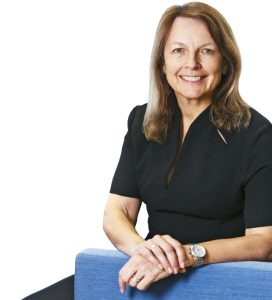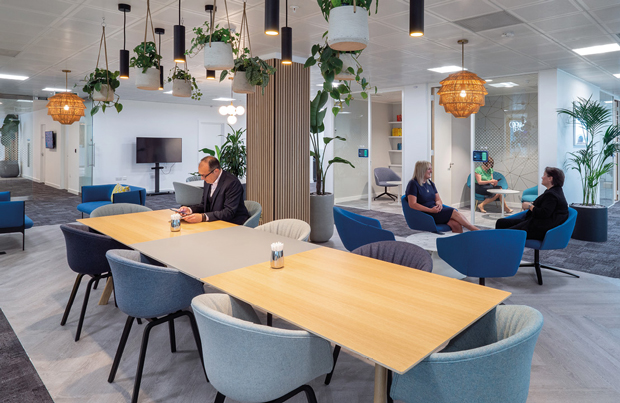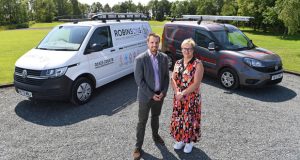 Liz Benison, the CEO of ISS UK and Ireland, explains why it’s the people behind the delivery of high-quality FM services who will create productive spaces, drive sustainable initiatives and determine the office of the future
Liz Benison, the CEO of ISS UK and Ireland, explains why it’s the people behind the delivery of high-quality FM services who will create productive spaces, drive sustainable initiatives and determine the office of the future
In 2021 Liz Benison was appointed the UK and Ireland CEO of ISS, reporting directly to Jacob Aarup-Andersen, ISS Group CEO. As we were in the midst of the pandemic and in person meetings weren’t viable, she went to see ISS’ London Canary Wharf offices to get a sense of ‘place’.
Given that the global facilities management and workplace experience business’ mission statement is to ‘provide placemaking solutions that contribute to better business performance’ this underlines her appreciation of the role of the workplace.
It also belies the fact that she came into FM from a tech and service outsourcing background. With a degree in production engineering and management, her experience in the technology sector, included roles at DXC Technology, Capgemini and Ford Motor Company, before moving to Serco as Divisional CEO.
She explains: “About 10 years ago I fell out of love with tech for tech sake – and I got the opportunity to go to Serco. The experience was brilliant, working with what we now know as ‘placemakers’ out in the field. I found it more satisfying affecting real change in behaviours and creating jobs for people who wouldn’t normally have opportunities, so I made the decision that tech was over for me and I was going to stay in that field.”
Prior to being appointed ISS UK and Ireland CEO she was Managing Director at Arriva Group. Her recruitment from outside the sector was part of ISS Group’s strategy to find a fitting person to run their biggest market following a few disruptive years, who could bring a fresh perspective, build a new team and take the business forward.
She explains: “The three challenges I was given were: improve our utilisation of technology, introduce more innovation as clients felt they wanted to be challenged and made to think, and the third was around data and how it needs to be better utilised to drive insights. The more I got into the topics though, I realised these are industry-wide issues, and all areas we can fix through strategy.”
THE ONEISS STRATEGY
ISS announced the OneISS new operating model in December 2020, just a few months before Benison’s appointment, which is a strategy to sharpen its focus on key segments, accelerate technology investments and introduce a new globally aligned operating model.
The goal says Benison: “Is to be the global leader in IFS (integrated facilities services) by focusing on market segments we have influence on, and for a limited number of services where we think we can be exceptional.
“It’s not being everything to everyone and showing up in the same way in every market. Jacob [Aarup-Andersen] talks about force multipliers – so that’s at the heart, how do we get to be the leader in IFS in the segments that we want to be?
“There are three additional ambitions to that, and the first is being the global company of belonging. The amazing thing we do for more than 350,000 people across the world is being the difference for them of a life in poverty and those first steps in the ladder of a job that could become a career.
“We want to be very intentional in the way we bring that to life, by making sure that is part of everyone’s experience when they come here. This is why we’ve launched a value proposition which is all about ‘a place to be you’ and bringing our D&I agenda to life.”
This includes investing in training opportunities for employees to get an externally recognised qualification and embracing societal values – for instance a commitment to offering more than 100,000 placemakers and/or their family members a recognised qualification by the end of 2025. This requires working with organisations that share these values and explaining to customers and suppliers why a living wage and a sustainable supply chain is important.
Says Benison: “If it comes to the point where we don’t think our values can converge we’ll take some tough decisions when qualifying new business, evaluating suppliers and so on. We don’t want to be the company that talks about all this and doesn’t do anything. We want to be measured on the actions that we deliver. It’s early days but it’s a massively important part of the agenda.”
The Group also plans to “leapfrog the sector on tech” which includes putting everything in the cloud to reduce costs and offer more agility. Two tech centres have been opened in Poland and Porto in Portugal that support ISS’ focus on building and bringing its own tech talent into the business. This offers the advantage of both generating its own tech and quickly bolting in new technology from the market when needed.
Benison explains the last part of the strategy is around sustainability: “We’re asking ourselves ‘what are we doing in 2023 to move the dial?’ It’s very straightforward, we’ll go to market through market segments so if we want to be number one in banking what thought leadership do we need to be able to generate? Do we need to employ people from the banking sector who learn about FM? We’ll then deliver services that are standardised and consistent wherever you go, so if you’re a global customer it will look and feel the same.
“What will help pay for those things is to have a very efficient back office. Coming from a different sector I’ve noticed the FM industry is quite far behind but it’s improving and using tech will be a massive help in having a data-led rather than instinct-led conversation, which is much more powerful.”





